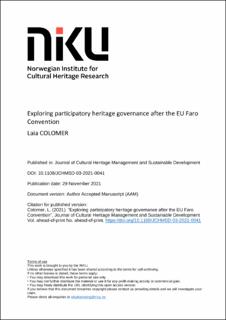| dc.contributor.author | Colomer, Laia | |
| dc.date.accessioned | 2024-04-02T14:56:23Z | |
| dc.date.available | 2024-04-02T14:56:23Z | |
| dc.date.created | 2021-11-30T12:41:33Z | |
| dc.date.issued | 2021 | |
| dc.identifier.citation | Journal of Cultural Heritage Management and Sustainable Development. 2021, 13 (4), 856-871. | en_US |
| dc.identifier.issn | 2044-1266 | |
| dc.identifier.uri | https://hdl.handle.net/11250/3124515 | |
| dc.description.abstract | Purpose – This paper aims to analyse the key Faro notions of “heritage community” and “democratic participation” as defined in the Faro Convention, and how they challenge core notions of authority and expertise in the discipline and professional practice of cultural heritage. Design/methodology/approach – This paper examines notions of “heritage community” and “democratic participation” as they are framed in the Faro Convention, and it briefly introduces two cases (Finland and Marseille) to explore their application. It then focusses on the implications of these two notions for heritage administration (expertise) in terms of citizen agency, co-creation of knowledge and forms of decision-making processes. Findings – The Faro Convention favours an innovative approach to social, politic and economic problems using cultural heritage. To accomplish this, it empowers citizens as actors in developing heritage-based approaches. This model transforms heritage into a means for achieving socioeconomic goals and attributes to the public the ability to undertake heritage initiatives, leaving the administration and expert bodies as mediators in this process. To bring about this shift, Faro institutes the notion of “heritage communities” and fosters participative governance. However, how heritage communities practise participation may follow different paths and result in different experiences due to local and national political circumstances. Originality/value – The Faro Convention opens up a window by framing cultural heritage within the realm of social and democratic instrumentality, above and beyond the heritage per se. But it also poses some questions regarding the rationale of heritage management (authority in governability), at least as understood traditionally under official heritage management discourses. | |
| dc.description.abstract | Exploring participatory heritage governance after the EU Faro Convention | |
| dc.language.iso | eng | en_US |
| dc.rights | Attribution-NonCommercial-NoDerivatives 4.0 Internasjonal | * |
| dc.rights.uri | http://creativecommons.org/licenses/by-nc-nd/4.0/deed.no | * |
| dc.title | Exploring participatory heritage governance after the EU Faro Convention | en_US |
| dc.title.alternative | Exploring participatory heritage governance after the EU Faro Convention | en_US |
| dc.type | Peer reviewed | en_US |
| dc.type | Journal article | en_US |
| dc.description.version | acceptedVersion | |
| dc.description.version | publishedVersion | |
| dc.source.pagenumber | 856-871 | en_US |
| dc.source.volume | 13 | en_US |
| dc.source.journal | Journal of Cultural Heritage Management and Sustainable Development | en_US |
| dc.source.issue | 4 | en_US |
| dc.identifier.doi | 10.1108/JCHMSD-03-2021-0041 | |
| dc.identifier.cristin | 1961648 | |
| cristin.ispublished | true | |
| cristin.fulltext | postprint | |
| cristin.fulltext | original | |
| cristin.qualitycode | 1 | |


